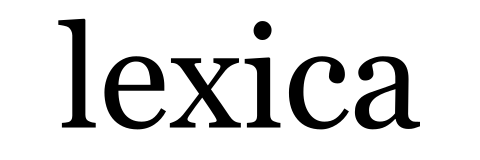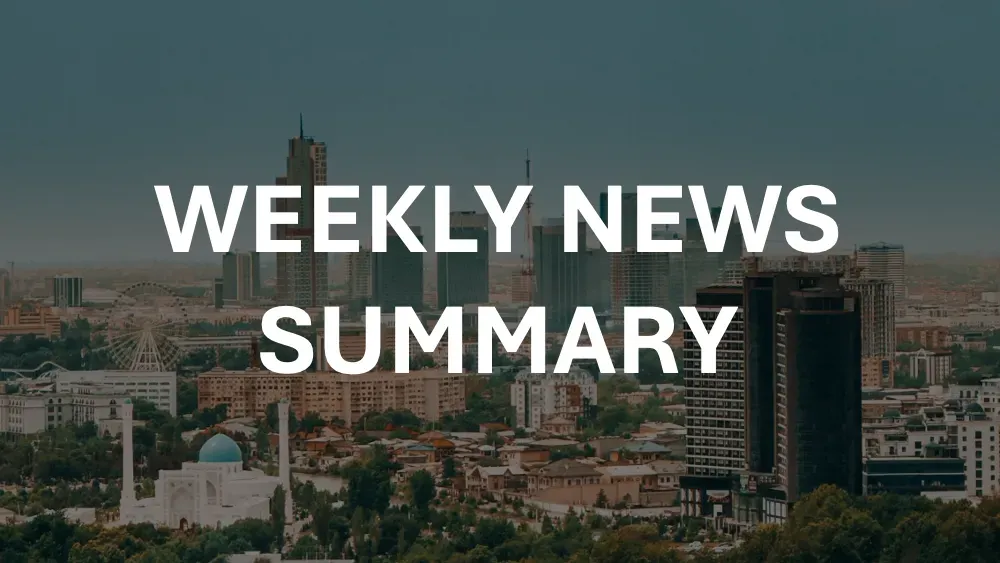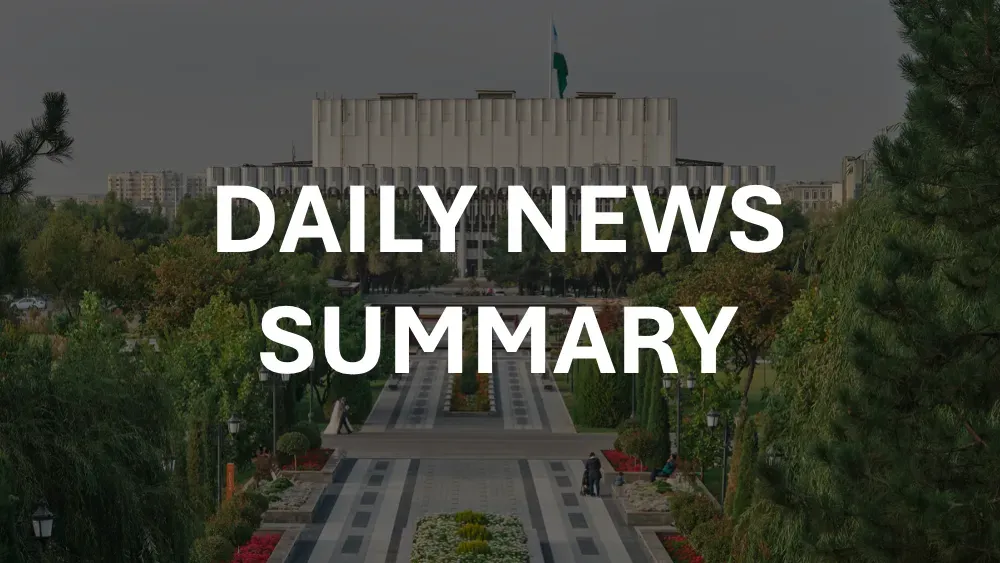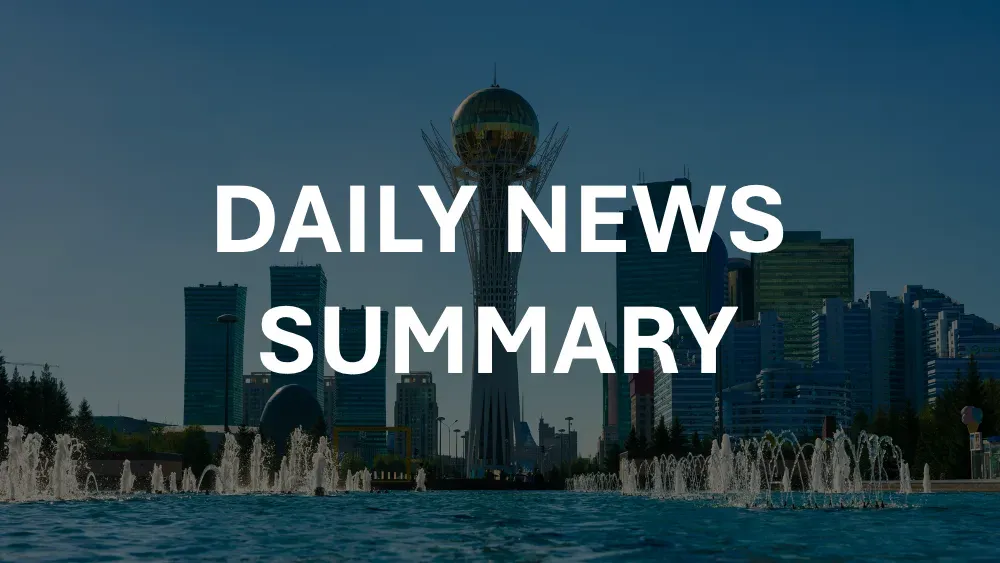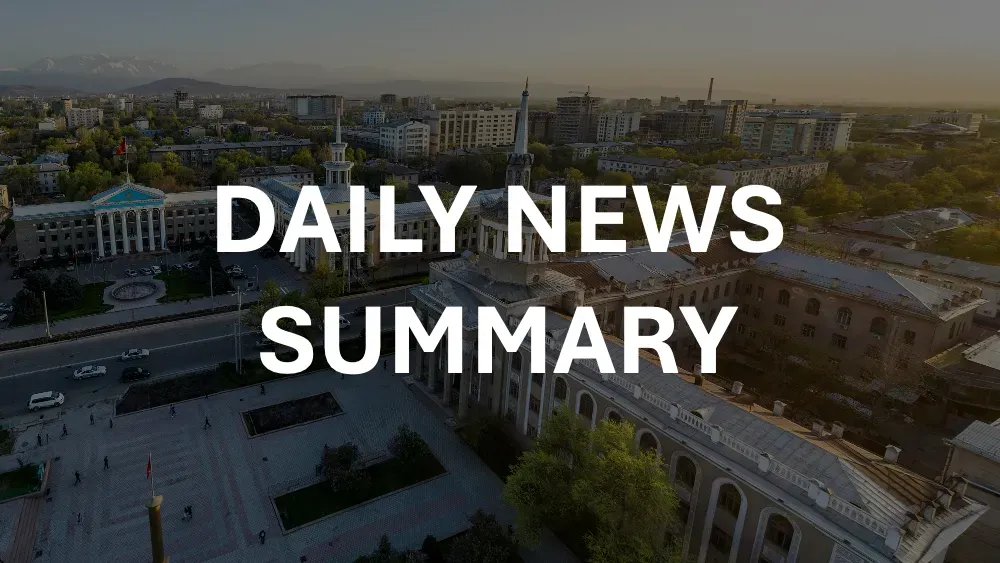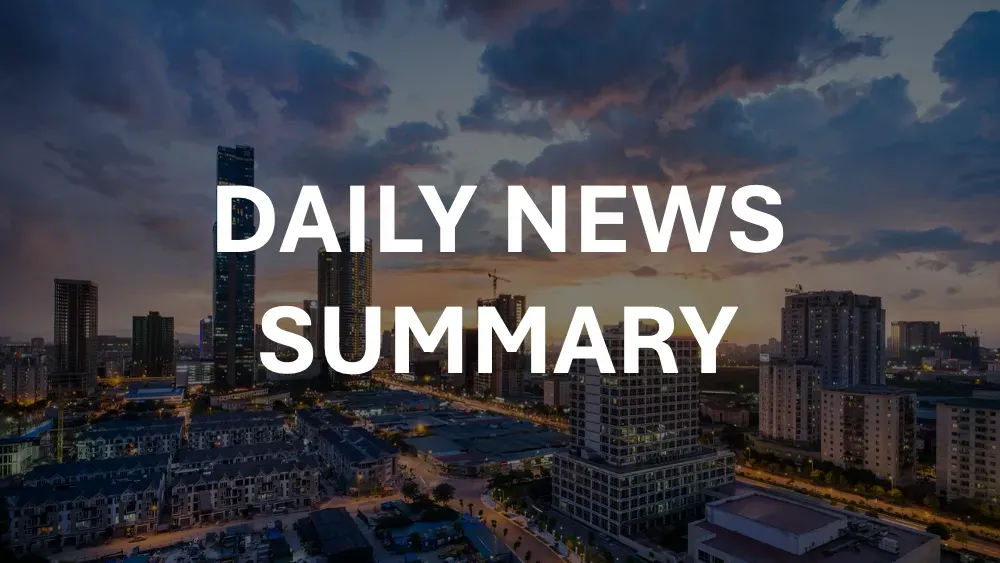This weekly digest showcases just 10 stories. Daily subscribers receive comprehensive intelligence briefs with 40 of the top stories organized by category. Don't miss the stories that matter.
Subscribe to Daily →
August 29, 2025 to September 4, 2025
This week's top 10 stories from Uzbekistan, selected from our daily intelligence briefs.
1. Beijing and Tashkent Agree 13 Mining and Nuclear-Related Projects Valued at $5 Billion
During President Shavkat Mirziyoyev’s official visit to Beijing, Uzbekistan and China agreed to implement 13 mining and nuclear-related projects valued at about $5 billion, focused on extraction, processing and geological exploration of energy raw materials and critical minerals (including coal and uranium). Agreements discussed with China National Nuclear Corporation (CNNC) cover uranium mine development, potential deployment of small modular reactors (SMRs) in Uzbekistan, technology transfer, and integration of fuel supply chains to support future peaceful nuclear power generation.
The package is intended to accelerate Uzbekistan’s mining sector, boost export capacity and advance its industrial and energy diversification agenda. Uzbekistan’s Minister of Mining Industry and Geology, Bobir Islomov, characterized the deals as opening “new horizons” for cooperation and as a catalyst to reinforce export potential; implementation timelines and financing details beyond the headline $5 billion were not disclosed.
From daily brief: 2025-09-04
2. EU and Tashkent Set to Sign Enhanced Partnership Agreement in Brussels on 24 October 2025
Uzbekistan and the European Union will sign an Enhanced Partnership and Cooperation Agreement (EPCA) in Brussels on 24 October 2025, replacing the 1999 accord and formalizing negotiations that began in 2019 and concluded in 2022. The EPCA establishes a broader legal framework covering trade rules, technical regulation, and sanitary and phytosanitary measures, and is intended to modernize EU–Uzbekistan ties in line with Uzbekistan’s ongoing economic reforms and regulatory convergence.
For international businesses and policy-makers, the agreement signals deeper political and economic engagement that could ease market access and regulatory cooperation, with practical implications for customs procedures, product conformity assessment and supply chains between Central Asia and the EU. António Costa, President of the European Council, confirmed the signing date and underlined the diplomatic importance of the ceremony in Brussels.
From daily brief: 2025-09-03
3. EU and Tashkent Expected to Sign Expanded Partnership Agreement on 24 October
The European Union and Uzbekistan (Tashkent) are expected to sign an Enhanced Partnership and Cooperation Agreement on 24 October 2025, replacing the limited 1996 framework and formalising a deal that was initialed three years ago. The agreement is designed to provide a comprehensive, rules-based mechanism for cooperation—particularly in trade and economic areas—aiming to streamline market access, regulatory alignment and sectoral collaboration across customs, services and investment.
For international businesses and investors, the pact could open deeper engagement with Uzbekistan’s market, support domestic reforms and increase predictability for cross‑border trade and supply chains; it may also influence regional trade dynamics by anchoring EU-aligned standards. Full details have not yet been published, but the signing would mark a significant upgrade in EU–Uzbek ties and signal stronger institutional pathways for future commercial and regulatory cooperation.
From daily brief: 2025-09-02
4. Beijing Forum Spurs Deeper China Ties with $4B Tashkent Deals and Renewables Push
At a government-backed Uzbekistan–China business forum in Beijing, more than 700 Chinese and Uzbek business leaders advanced strategic economic ties, signing nearly $4 billion in Tashkent-focused agreements covering retail-entertainment centers, hotels, drainage and transport upgrades, new substations and a 200 MW power unit, plus large leisure parks to boost tourism. Officials highlighted rising Chinese capital into Uzbekistan—$24.6 billion since 2017, a record $10.4 billion in 2024, with year-end deployment targeted above $15 billion—and trade of $13.8 billion in 2023 and $8.78 billion in January–July 2025.
Energy cooperation remains central as Uzbekistan transitions its power sector: Chinese firms are involved in roughly 30% of renewables integration and over $10 billion in related projects. Uzbek officials, including Deputy Prime Minister Jamshid Khojayev and Tashkent Deputy Mayor Sharof Rahmonov, pledged support for joint projects and outlined immediate infrastructure plans (six new substations initially and a 200 MW station), signaling accelerated implementation that could deepen China’s economic footprint and expedite Uzbekistan’s energy and urban upgrades.
From daily brief: 2025-09-01
5. Mirziyoyev Sets SCO Agenda with Expanded China Ties, Logistics Push, and Security Cooperation
Uzbekistan President Shavkat Mirziyoyev outlined a strategic deepening of ties with China and a broader agenda for the Shanghai Cooperation Organisation (SCO), stressing trade, infrastructure and security integration. Bilateral trade has tripled since 2017 to $14 billion and aims for $20 billion; Chinese investment in Uzbekistan totals $24.6 billion, highlighted by BYD’s electric-vehicle plant and a new Luban Workshop in Tashkent. Mirziyoyev prioritized the China–Kyrgyzstan–Uzbekistan railway to extend the China–Central Asia–West Asia corridor, while advancing digital and green initiatives and introducing a visa‑free regime in 2025 to ease mobility.
He framed these moves as strengthening the SCO’s role as a pragmatic platform for regional stability and cooperation—especially on counterterrorism, cyber threats and narcotrafficking—positioning Central Asia at the bloc’s core as the SCO expands to include India, Pakistan, Iran and soon Belarus. The emphasis on large infrastructure projects and security coordination signals Uzbekistan’s intent to translate growing Chinese economic engagement into geopolitical leverage and deeper regional integration.
From daily brief: 2025-09-01
6. Mirziyoyev Sets Growth, Green Energy, and Social Investment Agenda at Independence Day Address
On Uzbekistan’s 34th Independence Day (Aug. 29, 2025) President Shavkat Mirziyoyev framed recent macroeconomic gains and set a policy agenda prioritizing business support, a rapid energy transition, and expanded social investment. He highlighted GDP having roughly doubled over eight years to $115 billion in 2023 with year‑end GDP projected at $130 billion, foreign exchange reserves above $48 billion, and nearly $130 billion in FDI since 2016. Policy signals include tougher measures against the shadow economy, expanded incentives for “law‑abiding” entrepreneurs, and village master‑plans to extend urban‑style infrastructure, while pledging to mobilize resources for education, health and targeted social protection to reduce poverty and raise human capital.
Mirziyoyev also set a concrete green‑energy target: increase renewables’ share of power generation to 54% by 2030 (from ~30% this year), backed by a projected $35 billion in direct investment. For international professionals, the combination of fiscal support for social sectors, tightened shadow‑economy enforcement, and large-scale clean‑energy investment signals continued market liberalization with selective state steering—creating opportunities (renewables, infrastructure, education/health services) but also higher compliance and regulatory scrutiny for private actors.
From daily brief: 2025-08-31
7. Renewables Target Raised to 54% by 2030 with $35 Billion in New Investments
Uzbekistan announced a target to raise the share of renewable generation to 54% by 2030, supported by $35 billion in direct investment, President Shavkat Mirziyoyev said during the 34th Independence Day address in Tashkent’s “New Uzbekistan” park. The move responds to rapid demand growth—consumer numbers rose ~25% (≈1.6 million people) and electricity consumption climbed 54% (an extra 25 billion kWh) over eight years—while generation grew from 59 billion kWh in 2016 to 85 billion kWh today and is projected to exceed 97 billion kWh next year. This year Uzbekistan produced 6.5 billion kWh of green power, bringing renewables to 30% of installed capacity.
The plan signals large-scale deployment of solar and wind assets, greater private-sector participation and substantial grid upgrades to integrate intermittent resources and meet accelerating demand. For international investors and utilities, the $35 billion package and clear decarbonization target present market opportunities but also require attention to grid modernization, regulatory frameworks, and financing structures to ensure delivery by 2030.
From daily brief: 2025-08-31
8. Mirziyoyev to Attend SCO Summit in Tianjin, Hold Talks with Xi in Beijing, and Meet Putin During China Visit
Uzbek President Shavkat Mirziyoyev will undertake an official visit to China from 30 August to 3 September to attend the Shanghai Cooperation Organisation (SCO) Heads of State Council and “SCO Plus” summit in Tianjin and then hold bilateral talks in Beijing. The Tianjin meetings are expected to produce a declaration deepening cooperation on security, digital economy, green industry, energy and tourism; Mirziyoyev will join a leaders’ commemoration in Beijing on 2 September marking the 80th anniversary of Victory in World War II.
On 2 September Mirziyoyev will hold separate talks with Chinese President Xi Jinping to advance the Uzbekistan–China comprehensive strategic partnership and expand practical cooperation, followed by meetings with senior Chinese officials and major companies. The Kremlin has indicated Mirziyoyev will also meet Russian President Vladimir Putin on the sidelines of the China visit, signaling potential trilateral coordination on security and economic projects; outcomes could affect regional connectivity, energy collaboration, and Uzbekistan’s balancing between Beijing and Moscow.
From daily brief: 2025-08-30
9. Mirziyoyev Meets U.S. Presidential Envoy to Discuss Expanding Strategic Partnership
Uzbekistan President Shavkat Mirziyoyev met on August 28, 2025 with Paolo Zampolli, the U.S. President’s Special Envoy, to review ways to broaden the strategic partnership and multifaceted cooperation between Tashkent and Washington, according to kun.uz. The meeting produced no public announcements, timelines or specific initiatives, indicating discussions were at a framework-setting, high‑level stage.
For international professionals, the engagement signals continued momentum in bilateral ties—with potential implications for trade, investment and security cooperation as Uzbekistan advances its reform agenda. The absence of concrete deliverables suggests follow‑up negotiations will be needed to translate dialogue into sectoral projects or binding agreements.
From daily brief: 2025-08-30
10. Japan’s Foreign Minister Courts Deeper Strategic Ties in Tashkent with First Bilateral Strategic Dialogue
Japan’s Foreign Minister Takeshi Iwaya made a two-day visit to Uzbekistan on 26–27 August, where he met President Shavkat Mirziyoyev and held the inaugural bilateral Strategic Dialogue with Uzbek Foreign Minister Bakhtiyor Saidov. The meetings produced a joint communiqué committing both governments to institutionalize high-level engagement and accelerate practical cooperation across trade, investment, finance and technical assistance; officials highlighted rising trade volumes and major Japanese-led projects already under way.
Discussion targeted concrete initiatives to expand economic ties and people-to-people links, including plans to broaden the Uzbekistan–Japan Center and explore a joint university with leading Japanese institutions, as well as cooperation on visas, migration, air routes and summit preparations for the forthcoming “Central Asia + Japan” meeting. The visit—coming after Uzbekistan’s National Day presentation at EXPO 2025 Osaka—signals Tokyo’s intent to deepen strategic and sectoral diversification in Central Asia through structured, high-level dialogues.
From daily brief: 2025-08-29
These weekly highlights are a small sample of what's happening. Daily subscribers get comprehensive briefings with 40 top stories that connect the dots between events, track developing stories, and provide the context you need for informed decision-making.
Upgrade to Daily →
